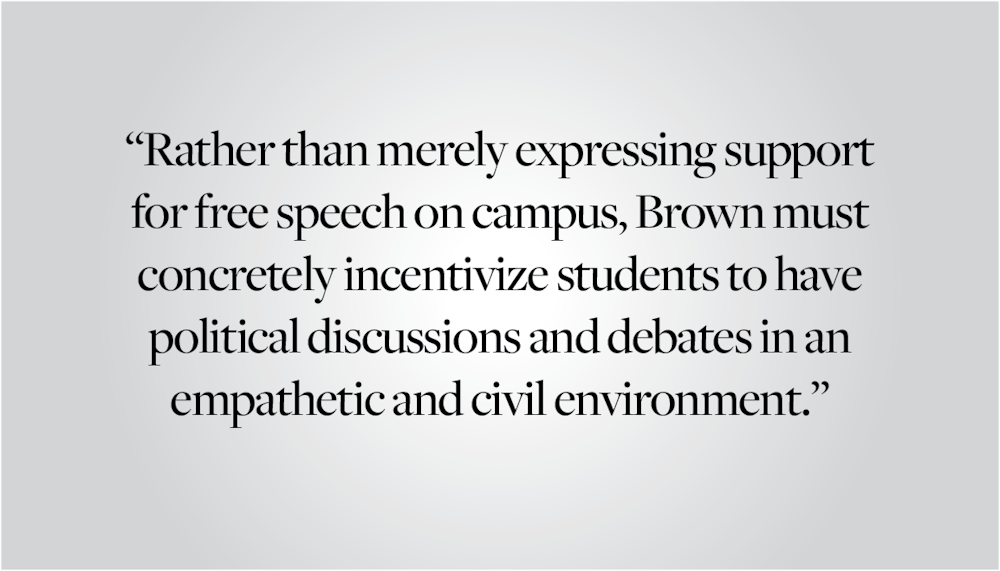Think of the four words or phrases that you feel are most relevant to the current political situation in the U.S. — mine are “Biden,” “Trump,” “gun control” and “abortion.” Check how frequently these terms appear in the headlines of a popular newspaper's opinion section, then repeat the process with The Brown Daily Herald's opinions section. Notice any differences?
When I went through this exercise, I ended up counting four of these words in the top five opinion headlines of the New York Times — but none in The Herald. Though it is unsurprising that the broadly focused Times references national political buzzwords more than the locally focused Herald, it is still striking that not a single Herald opinions headline from this semester mentions any of these words.
This lack of columns about hot-button political issues is a concerning symptom of the fact that many Brown students feel uncomfortable openly discussing politics. The remedy is University-backed political exposure therapy.
Many Brown students self-censor, perhaps incorrectly assuming that their peers all share the same political viewpoints and fearing that they will be ostracized for their own. There is no denying that Brown’s student body leans left, with over 20% of each class year identifying as “very liberal” (compared to 7% nationally), and only 22% disapproving of Joe Biden's job performance in mid-October 2021 (compared to around 45% nationally at the time). But despite these general breakdowns, Brown students still hold diverse and varied political beliefs. For example, a substantial number of students back stereotypically conservative viewpoints: Just under 25% support the Second Amendment, and just under 20% believe Brown should not consider race in admissions. Plus, many students may not have any strong political convictions at all — after all, 47.3% of eligible students did not vote in last November’s midterms.
Because many students don’t realize how politically diverse their peers are, they fear being judged for even minor political disagreements. More than half of both liberals and conservatives at Brown self-censor, proof that this issue is not isolated to any particular political group. And it is only getting worse with time.
Rather than merely expressing support for free speech on campus, Brown must concretely incentivize students to have political discussions and debates in an empathetic and civil environment. This doesn’t need to be overly elaborate or engineered — just something that will get students involved and intellectually excited. The University could easily host a debate tournament with highly desirable prizes like a week of unlimited flex points or a higher spot in the housing lottery, giving students very strong incentives to participate. If an event like this pushes Brown students to deliberately work with others who disagree with them. The University could also take inspiration from the depolarization nonprofit Braver Angels — which holds workshops gathering liberals and conservatives to find points of agreement on specific issues — and challenge politically at-odds groups of students to come to collective stances on controversial political issues. These actions could go a long way in helping students feel comfortable sharing their differing political opinions.
As long as they do not express clearly bigoted or disrespectful viewpoints, Brown students should be able to feel they will not be ostracized for their politics. A University-sponsored event would go a long way in achieving this aim, amounting to large-scale exposure therapy that would help students confront their political anxiety through repeated exposure to benign political debate.
The scale of self-censorship on campus demands direct action from Brown. Students must feel more comfortable sharing their beliefs on campus. As a University, we must encourage purposeful engagement in respectful conversations with people we like but disagree with. It is only by driving these types of interactions frequently and sincerely across campus that Brown can truly claim to be an institution capable of housing meaningful political dialogue.
Ben Aizenberg ’26 can be reached at benjamin_aizenberg@brown.edu. Please send responses to this opinion to letters@browndailyherald.com and other op-eds to opinions@browndailyherald.com





